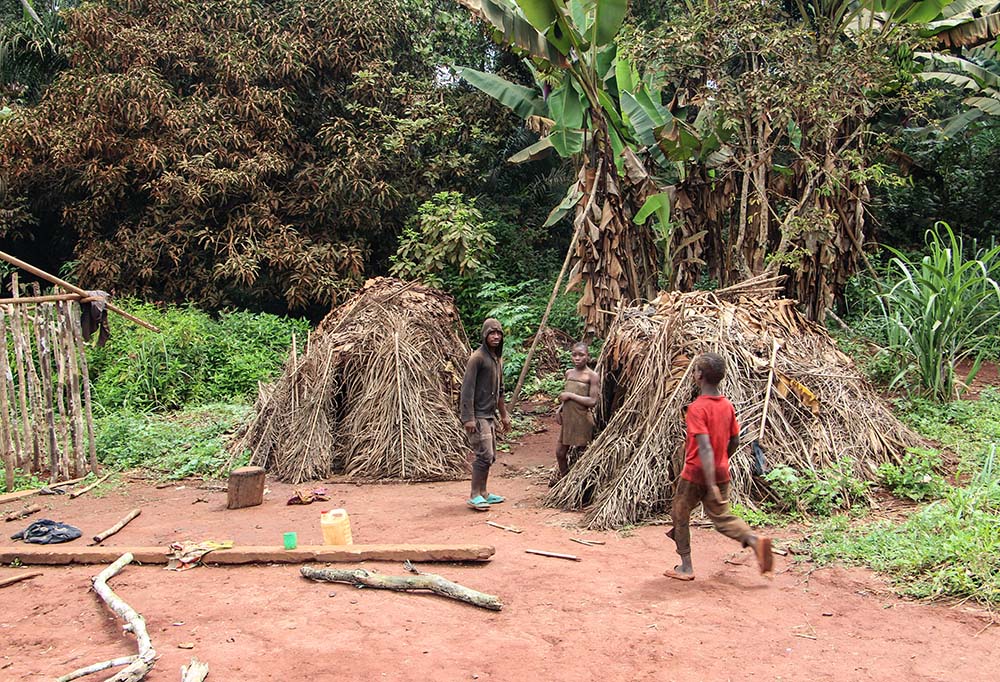
Baka young people are seen in a courtyard in front of traditional Baka huts known as mungulu in Elango village in Cameroon's East Region. (Angel Ngwe)
Bernard Messono today lives by the roadside.
A 28-year-old Indigenous Baka man from Elango village in Cameroon's East Region, he was forced out of his natural home in the forest by encroaching logging and mining companies. But a third source also led to his people's displacement: government conservation efforts.
"We come from the forest," Messono said. "No one should tell us not to enter the forest. The forest is everything to the Baka."
"The forest for the Baka is a source of life," he told EarthBeat during a September visit to his new village, roughly 80 km (50 mi) northeast of the Dja Faunal Reserve where he once lived. "It gives us food: honey, fruits, wild tubers and wild game. It is also our pharmacy because when you are sick, it is from the forest that you get the tree leaves, the bark, and roots that treat you."
The situation facing the Baka people is a familiar one for Indigenous communities across Africa who have faced a loss of access to ancestral lands due to conservation efforts to preserve biodiversity and ecosystems. But it's a problem that could only grow without steps to respect and protect Indigenous rights, Indigenous peoples and their allies say.
Advertisement
It is one of the issues under discussion this week as nations meet in Colombia under the United Nations Convention on Biological Diversity. The main focus of the meeting is enacting a global pact to halt and reverse biodiversity loss, including a goal of conserving 30% of global lands and waters by 2030.
Faith-based organizations have been vocal at the COP16 summit and beyond in urging that conservation measures, while critical for preserving species and ecosystems, must respect the rights and land ties of Indigenous communities and include them in decision-making about ways to protect nature.
That includes the Catholic bishops of Africa, who have joined other Catholic groups in urging the European Union and the African Union to ensure that biodiversity conservation funds do not result in the displacement of Indigenous communities in Africa.
In a Sept. 17 statement, the Justice, Peace and Development Commission of the Symposium of Episcopal Conferences of Africa and Madagascar (known as SECAM) pushed the European Union to "take proactive measures to ensure that EU biodiversity conservation funds do not lead to mass land alienation and threaten the livelihoods and stability of indigenous and local communities on the continent."
The commission called for "a new conservation paradigm that respects and protects the rights of Indigenous peoples and local communities."
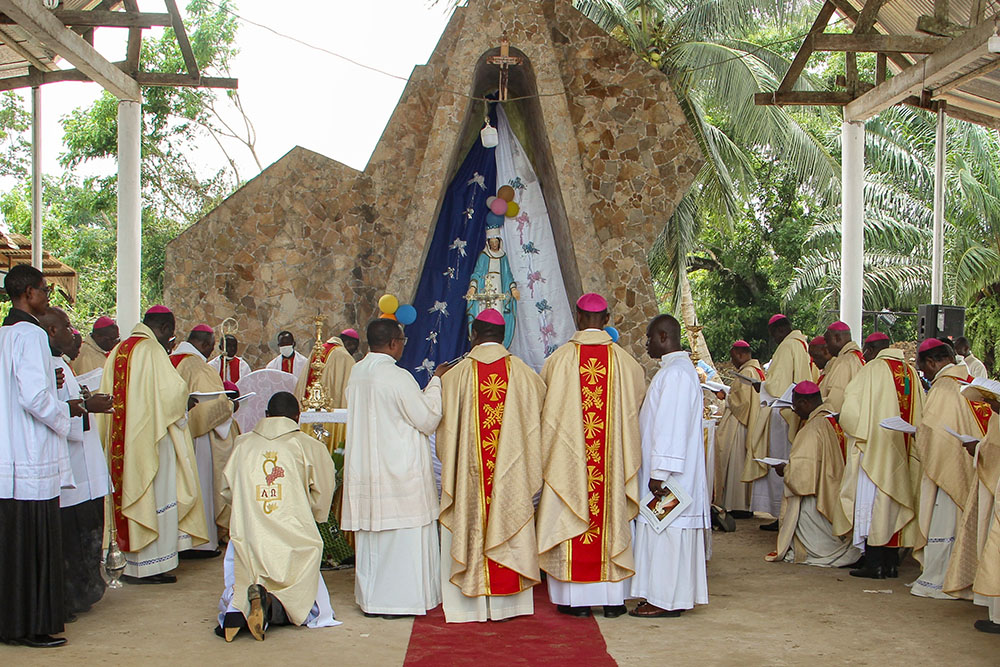
Cameroon's bishops pray at the Marian shrine of Marienberg near the city of Edea as they rededicate the country to the Immaculate Heart of Mary April 24, 2022. (CNS/Ngala Killian Chimtom)
SECAM, which represents the eight regional bishops' conferences in Africa, also joined a policy brief on Indigenous rights coordinated by CIDSE, a network of most European-based Catholic development organizations, alongside other Catholic, Indigenous and nongovernmental organizations.
The Catholic appeal is part of a broader initiative to protect the human rights of Indigenous peoples and local communities, who make up a small portion of the global population but hold an outsized role in stewarding the world's biodiversity. A 2018 study found that Indigenous peoples manage or have tenure rights over more than a quarter of the world's land surface and roughly 40% of ecologically protected areas.
The call highlights a recurring issue: Conservation initiatives, much like development efforts, have often led to the eviction and displacement of Indigenous communities from lands they consider their natural home.
A nomadic people recognized by their small stature, the Baka are the first known inhabitants of Cameroon. They have lived as hunter-gatherers across the lush rainforests of the Congo Basin for thousands of years.
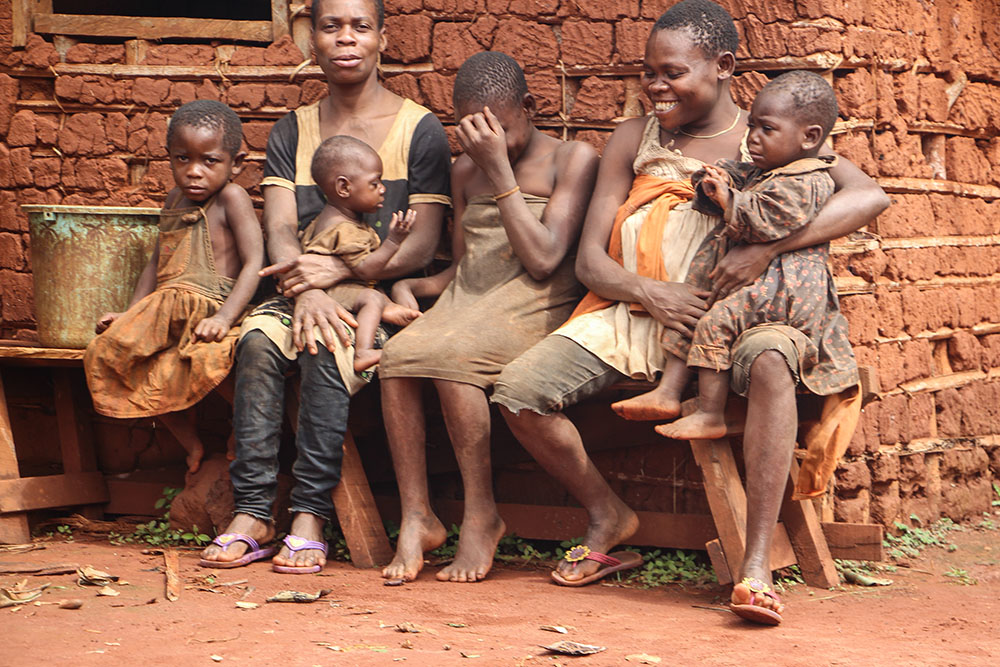
A Baka family is pictured in Elango village in Cameroon's East region. For thousands of years, the Baka lived in the forests of the Congo Basin but have been displaced in recent decades due to extractive industries and conservation efforts. (Angel Ngwe)
The eviction of the Baka from their natural home in the forest dates back to the 1960s. Both the outgoing colonial French government and the incoming independent government pushed the Baka people from the forests to allow logging and the creation of national parks.
Access was further limited in 1994 — two years after Cameroon ratified the U.N. Convention on Biological Diversity — when the government established conservation regulations for forests, fisheries and wildlife resources that included a provision restricting access to protected biodiversity areas.
Removing the Baka from the forest is akin to disconnecting them from their god, known as the Jengi, Messono said.
Traditionally, the Baka would kill an elephant each year to connect with the Jengi. This practice has ceased due to the protections accorded to the endangered African forest elephant and other iconic species.
"The law restricts us from going to the reserves, which now harbor most of the species we use for the Jengi," Messono says.
"I am not happy with the situation," he added, explaining the Baka now use animals of "little spiritual value," like pangolins, antelope and even porcupines to perform the Jengi ritual.
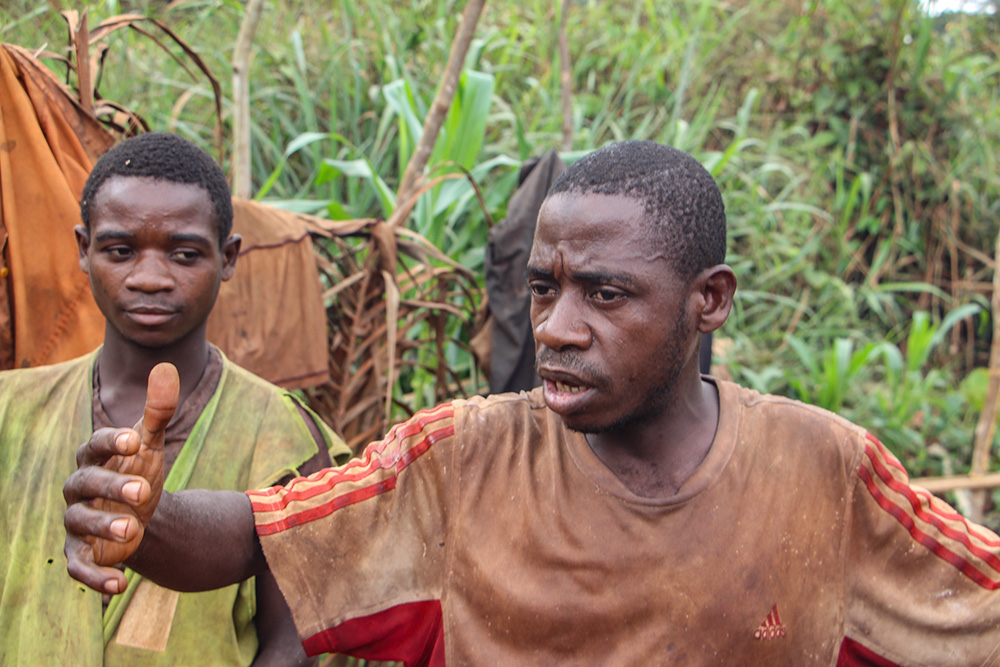
Bernard Messono, 28, speaks out against the displacement of his Baka people from their traditional forest lands in Cameroon's East Region. (Angel Ngwe)
Roughly 400 kilometers (250 miles) away, near the Lobeke National Park to the southeastern part of Cameroon, Ndobo Marianne, a Baka woman, voices her frustration over the park's establishment, which restricts access for the Baka people.
"You get harassed by eco-guards when you enter the park in search of a means of survival," she told EarthBeat.
Across Africa, other Indigenous communities face systemic violations of their rights as governments and nongovernmental organizations strive to keep environments inviolate.
In the Democratic Republic of Congo, the Kahuzi-Biega National Park — a protected area and UNESCO World Heritage site renowned for its tropical forest and abundant biodiversity — has become a source of conflict.
A 2022 report by Minority Rights Group, a nongovernmental organization defending Indigenous peoples' rights, documented what it deemed "the highly organized, grievous, and widespread human rights abuses" that park guards and the Congolese army carried out between 2019 and 2021 against the Batwa people.
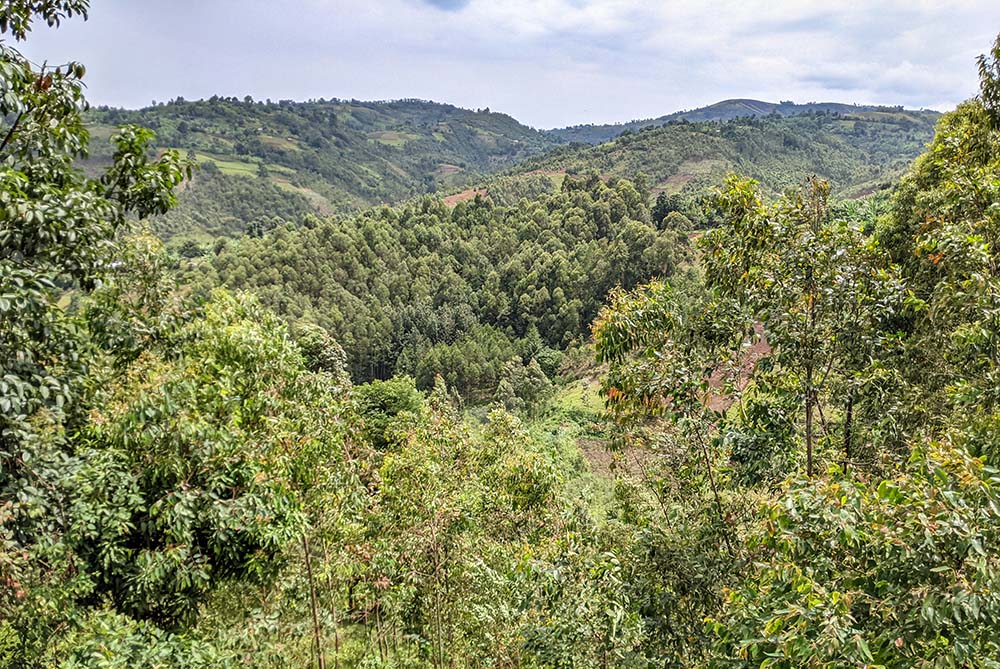
A landscape in Kahuzi-Biega National Park in the Democratic Republic of Congo (Wikimedia Commons/Gloiremutaliko21)
The report, titled "To Purge the Forest by Force: Organized Violence Against Batwa in Kahuzi-Biega National Park," stated that the violence began after some Batwa families returned to their ancestral land inside the park. The report's authors gathered evidence of soldiers burning whole villages, sexual violence against women, and at least 20 Batwa members killed.
The Batwa were initially removed from the land in the 1970s and subjected to "four decades of broken promises of resettlement, reparations and justice from the Congolese government and other stakeholders," according to the report.
Conservation efforts have also been a main driver of displacement in Tanzania, including for its Maasai people, said Joseph Oleshangay, a human rights lawyer, activist and a Maasai traditional leader (alaigwanani).
"From Ngorongoro, Loliondo and Ruaha, displacement is happening like no time before. In Ngorongoro, the government is pushing around 100,000 people to create an exclusive conservation scheme. In Loliondo, thousands of people have been effectively displaced and the government created exclusive hunting areas for the Dubai Royal family," Oleshangay said.
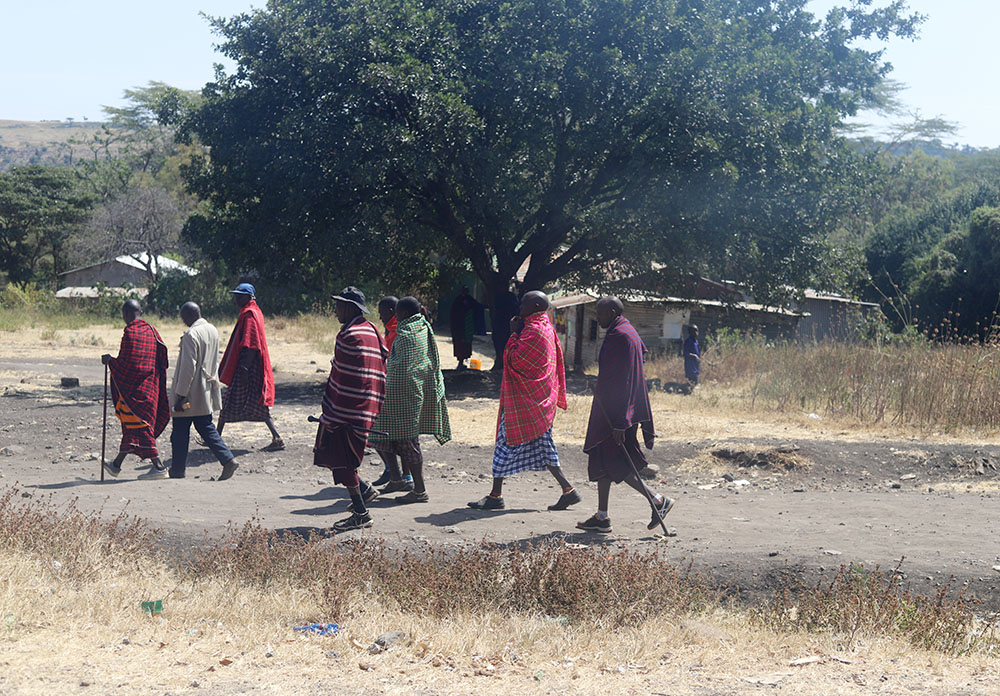
A group of Maasai elders walk together in the Ngorongoro conservation area in northern Tanzania July 8. The Maasai said that they fear meeting each other in groups because of the threats they face from the government, which is evicting the Maasai from their ancestral land in the name of wildlife protection and tourism. (GSR photo/Doreen Ajiambo)
He said the Tanzanian government goes as far as using a "scorched-earth policy" to force people out of the conservation parks. In Ngorongoro, for example, the government since 2022 has paralyzed all social services in an effort to trigger mass displacement, according to Oleshangay. In Loliondo, Oleshangay said, the government has seized and confiscated more than 58,000 livestock, including 36,000 between January 2023 and April 2024 — a blow to families' finances.
"Government is limiting the means for food supply and trading activities," he said. "Livestock traders are arrested. People doing mobile money transactions are arrested because the government believes limiting access to food supply is an easy push for people to get out."
In light of these reports, Catholic bishops in Africa are urging the European Union not to fund conservation projects that result in the violation of Indigenous peoples' rights.
CIDSE, the bishops of SECAM, and other partners in a policy brief have called for robust monitoring and accountability measures to ensure international biodiversity finance doesn't lead to human rights abuses.
The brief, which was presented by CIDSE officials Oct. 30 at COP16 in Cali, also urged the EU to prioritize funding for agroecology and other sustainable farming practices — which they say protect biodiversity while safeguarding human rights and livelihoods — and to make funds easier to access for Indigenous peoples and local communities.
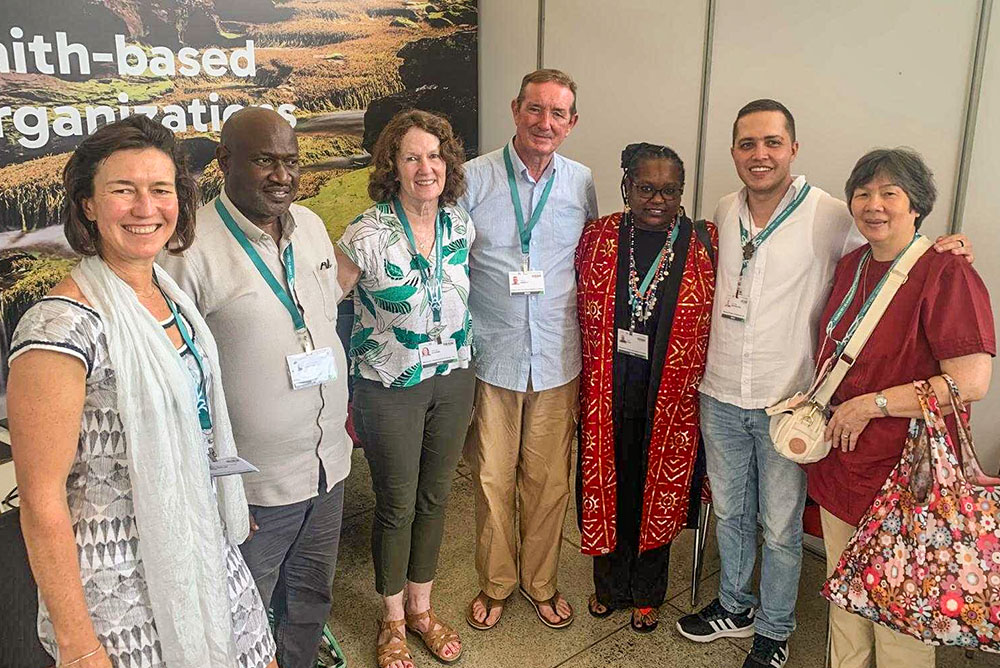
Members of the Maryknoll Office for Global Concerns join with Amazon and Maasai leaders at the faith hub at the COP16 United Nations biodiversity summit in Cali, Colombia. An Oct. 28 event focused on strengthening partnerships with Indigenous and local communities to halt biodiversity loss. (Lisa Sullivan)
The Catholic groups stressed that biodiversity efforts must begin with recognizing the "crucial role" Indigenous peoples play in protecting and restoring nature. It noted that the 2022 Kunming-Montreal Global Biodiversity Framework includes recognition of Indigenous and local communities' rights to their traditional lands.
"Respecting and protecting the right of Indigenous Peoples and other local communities to stay on the land and giving them control over key decisions impacting their land is therefore the most urgent and effective measure to halt biodiversity loss," the Catholic report said.
Oleshangay concurs, arguing that for any conservation effort to be successful, it must involve Indigenous and local communities.
"The danger of the conservation efforts that do not involve Indigenous and local communities is that, rights such as right to land, access to resources like water, pasture ... right to cultural practices, right to safeguard of spiritual sites are all not considered in the implementation of conservation schemes," he told NCR.
The joint policy brief outlined several key recommendations for the EU to consider before funding conservation initiatives.
It called for an end to "fortress conservation" approaches — where people are evicted from ancestral lands and humans separated from the rest of nature. Instead, the brief favors co-management models that empower Indigenous peoples and local communities to protect biodiversity in partnership with global actors.
"This means avoiding any kind of displacement, promoting conservation approaches that integrate humans and nature, and ensuring biodiversity finance is managed and monitored by local communities," SECAM said in its statement.
The African bishops also called for the legal recognition and protection of the human right to land as a fundamental element of effective biodiversity conservation. SECAM's Justice, Peace and Development Commission insisted that all biodiversity projects, especially those funded by the EU, must secure the free, prior and informed consent of Indigenous communities, in line with international human rights standards.
For Bernard Messono, it's critical that the Bakas are incorporated in conservation efforts.
"We cherish the forest. We know how to preserve the animals," he said. "For instance, when we go hunting, we don't kill female animals, especially the pregnant ones. We kill older males for food so that the animals don't go extinct.
"We can bring that experience to the conservation agenda."







